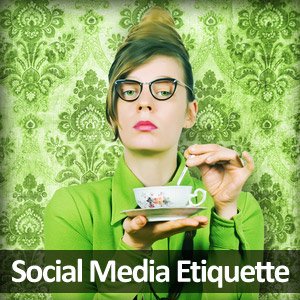As more and more businesses and self-employed professionals head online, heeding the call for all things social media-related, there seems to be some confusion regarding what is considered both acceptable and commendable behavior in social media circles, versus what is looked at as unnecessary, annoying, or just plain offensive.
Many writers and bloggers have made attempts to offer some tips on social media etiquette, and a lot of the popular advice is pure common sense that should be followed. But the truth is that etiquette online goes beyond saying “please” and “thank you” and refraining from flooding people with unwanted, spammy messages or material
What many still fail to recognize is that one’s behavior online presents an image (one that often does not involve face-to-face contact and all the social cues that come along with it), and in the space of the Internet, impressions are made very quickly, yet are hard to break. Moreover, people who are online often have already become accustomed to mentally tune out any unwanted solicitations and to discredit those who are obviously trying to be something they are not.
That said, here are a few areas where the lines of social media and online etiquette seem a bit blurred:
Commenting… Are You Human?
Sometimes, the only thing genuine and human about some comments is that the author correctly filled in the captcha phrase. If you are going to make the effort to write a comment, then make it relevant in some way to the post or article. We’re not talking paragraphs of Pulitzer Prize winning writing, just a few relevant lines will do. It’s not so nice for the writer to receive a comment that clearly shows the commenter didn’t bother reading the article.
And, yes, I know people are motivated to leave these robo comments because they want a link back to their site or they want to advertise their product or service. But the comments section of a post or article is not solely a platform to hawk your wares.
If you want to reference your site then at least make an attempt to read the article, write a few relevant lines, and then gently work in a commercial or self-promotional reference. For example:
Some good points here… but business owners considering outsourcing should also make sure that the they have a very clear job description, realistic expectations, and some way to evaluate the success (or failure) of the setup. For those who would like more information on how to get the most out of outsourcing, I wrote a post about it on my blog.
Even if you are trying to generate a link, many website developers and SEO experts rightly point out that these links (even on do-follow sites) likely provide very little if any link juice and probably aren’t so valuable if they are removed from a good comment.
Online Self Expression Versus Insensitivity
Every website and social space has it’s own set of rules (whether they are clearly stated or are unspoken) of what is considered acceptable language and expression. Business owners and self-employed professionals should make it a point to adhere to the level of formality, acceptable language, and any other sensitivities when visiting another’s site. This even goes for social networking and social bookmarking platforms as well as forums and the like.
But… the rules change on one’s own site. Some people may use language or make references to things that others may find offensive, yet often it is just an extension of who they are socially, culturally, and as individuals. Just because there are readers out there who may be offended by your style does not necessarily mean that you have to censor your content or language; every business owner or professional needs to make that personal judgment call. As long as the site’s owners and contributors are avoiding criminal activities, then those who find the material offensive shouldn’t go there or partake of the site’s services.
You Can Be Selective and Still Be Accessible
Realize that you do not have to respond to every comment made on your article or post, nor to every message or email you receive. Is it a nice thing to do? Yes. Are there some supermen and women out there who seem to somehow find the time to do it, and do it properly? Yes. But it is not for everyone.
Just because a comment or message goes unanswered does not mean that you are appearing to be inaccessible or that you will be offending someone. In fact, setting healthy boundaries and limits and focusing on quality responses and engagements over quantity may actually increase your reputation online and the overall impression people have about the value of your goods or services. Why? Because you are telling people that you recognize the value of your time, energy, knowledge, and skills. Moreover, it gives the impression that you are busy, and the implication is that your time and services are in demand. This subtle, implicit message, even if it isn’t true, can actually help to increase the number of people wanting to do business with you.
In short, Internet etiquette is a delicate balance- one that requires you to consider other people but also leave enough room to be yourself.
